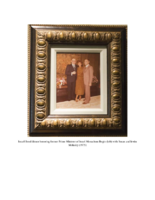Search the Special Collections and Archives Portal
Search Results

Transcript of interview with Mike and Susan Baller by Barbara Tabach, March 16, 2016
Date
Archival Collection
Description
In this interview, Mike and Susan Baller reflect upon their lives in Las Vegas, from growing up as teenagers amongst the tight-knit Jewish community, to mob influence on the city, and the impact of the city's growth. Mike shares stories about first arriving in Las Vegas to live, being a teenaged busboy at Binions Horseshoe to being related to Moe Dalitz -- in Michigan Mike drove a truck for the Dalitz dry cleaning business.
Text

Transcript of interview with Gil Cohen by Claytee White, August 5, 2014
Date
Archival Collection
Description
Interview with Gil Cohen by Claytee White on August 5, 2015. In this interview, Cohen discusses growing up in Las Vegas and attending University of Nevada at Reno. He returned to Las Vegas to join the management training program at the Stardust. He talks about his friendships with Moe Dalitz and Carl Cohen, and his interest in golfing. He also discusses corporate ownership of casinos, unions, and his experiences working at different Strip hotels.
Gil Cohen came to Las Vegas in 1957, when was ten years old, when his father, Yale Cohen, was recruited by Moe Dalitz to work at the Stardust Hotel and Casino. Cohen graduated from University of Nevada Reno, and started working at the Stardust through the management-training program. In 1975, he was made hotel manager, his first of many leadership positions in Strip properties, which have included the Dunes, Aladdin, Hacienda and Monte Carlo, where he currently works as a casino host.
Text
Irwin Molasky oral history interview
Identifier
Abstract
Oral history interview with Irwin Molasky conducted by A. D. Hopkins on June 08, 1999 for the Las Vegas Review-Journal First 100 Oral History Project. In the interview, Molasky discusses his early life in Ohio and moving around the United States before settling in Las Vegas, Nevada in 1951. He then talks about his company, the Molasky Group of Companies, and projects the company had been associated with. One project Molasky focuses on is the design and opening of Sunrise Hospital in 1958, located in Las Vegas. He recalls Nevada Senator Howard Cannon cutting the ribbon for the hospital's opening, as well as business partners for the hospital including Allard Rowan, Morris Barney "Moe" Dalitz, and Roy Cohn. Other Las Vegas projects Molasky discusses include the Boulevard Mall, Paradise Palms housing community, and the Bank of America Plaza near Fremont Street. Molasky also talks about a vocational outreach project he helped develop at the Irwin & Susan Molasky Junior High School. Lastly, Molasky talks about his personal hobbies and Las Vegas's urban growth.
Archival Collection
Kolod, Ruby, 1910-1967
Ruby Kolod (1910-1967) was a co-owner of the Desert Inn hotel-casino in Las Vegas, Nevada. Born in New York City on July 27, 1910, Kolod moved to Las Vegas around 1950 to purchase the Desert Inn with longtime associate Moe Dalitz and other investors. The Desert Inn group of investors had ties to organized crime and owned several hotel-casinos in Las Vegas in the 1950s and 1960s. In 1964, Kolod was sentenced to four years in prison for threatening Robert Sunshine in relation to an oil-lease investment.
Person

Transcript of interview with Wilma and Burt Bass by Barbara Tabach, February 9 , 2015
Date
Archival Collection
Description
In 1939, Wilma (Frank) Bass was born in New York City, where she began her involvement in theater at the age of ten. Almost twenty years later, she met Burt Bass (1932- ) when both worked for a photography studio, one of Burt first post-high school jobs. Burt opened his first professional photography studio in 1962, shortly after he married Wilma in 1960. The couple soon had two daughters – Jill and Wendy – and moved to Las Vegas in 1974. Burt initially worked for his brother-in-law Ed Frank's check cashing businesses and later opened his own photography business, Burton Studio. He later added services such as fingerprinting, background checks, and photographs for identification cards. Wilma worked as a jewelry salesperson, first at the Gold Factory then at Nieman Marcus. Socially, she was very involved with Temple Beth Sholom’s Sisterhood, using her theater talents to write, direct and produce various shows for the Sisterhood, ORT as well as B’nai B’rith Youth Organization. In this interview, Burt discusses his photography business, the migration of its storefront around town, and his colorful landlords, including individuals like Moe Dalitz and Art Marshall. Wilma talks about her sales career in the local jewelry industry, and more extensively, she shares memories of her involvement in the Jewish community with theater productions. Much of the discussion revolved around related news articles and personal photos from their relationships and activities within the Jewish community. The couple also shares stories of friendships with local entertainers, including Jerry Lewis and Neil Sedaka.
Text
Kleinman, Morris
Morris Kleinman was a part-owner of the Desert Inn hotel and casino in Las Vegas, Nevada, along with his business partners Moe Dalitz and Ruby Kolod. Before Kleinman and Dalitz relocated in Vegas in 1949, they were members of the Mayfield Road Gang in Cleveland, Ohio.
Schwartz, David G. Roll the Bones: The History of Gambling. Casino Edition. Las Vegas: Winchester Books, 2013.
Person
Wilma and Burt Bass oral history interview
Identifier
Abstract
Oral history interview with Wilma and Burt Bass conducted by Barbara Tabach on February 09, 2015 for the Southern Nevada Jewish Heritage Project. In this interview, Burt Bass discusses his photography business, the migration of its storefront around town, and his colorful landlords. Wilma Bass talks about her sales career in the local jewelry industry, and more extensively, she shares memories of her involvement in the Jewish community with theater productions. The couple also shares stories of friendships with local entertainers, including Jerry Lewis and Neil Sedaka.
Archival Collection
Tucker, Sam
Sam Tucker was a Las Vegas, Nevada casino executive and former bootlegger. He was an associate of Moe Dalitz in the Prohibition-era liquor trade in Cleveland before moving to Las Vegas in the late 1940s to invest in the Desert Inn with Dalitz and others. Tucker served as chair of the United Jewish Appeal in Las Vegas from 1953 to 1956.
Person

